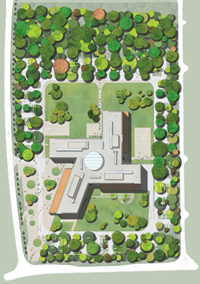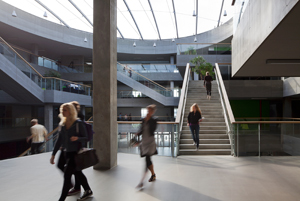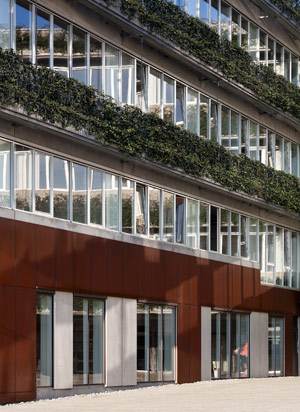 |
 |
 |
 |
 |
 |
| |
 |
|
 |
 |
 |
  |
  |
 |
 |
 |
 |
|
|
 |
|
 |
 |
 |
OPERA |
 |
|
 |
|
 |
 |
 |
| |
 |
| 
 |
Campus Aarhus N - VIA University College
|
|
 |
 |
 |
 |
PROGETTISTA |
 |
|
|
 |
|
 |
 |
 |
| |
 |
|
 |
 |
 |
 |
DESCRIZIONE |
 |
|
|
 |
|
 |
 |
 |
| The Central Square |
 |
|
 |
 The campus building consists of four wings which centre on a light filled and dynamic atrium – a central square. The core functions are placed around the square – auditoriums, a multimedia centre, the canteen, and other shared facilities. The layout of group rooms, open study spaces, and lounge areas make good use of the spatial diversity in the atrium, thus accommodating the students’ needs for different spatial opportunities to support their learning. The campus building consists of four wings which centre on a light filled and dynamic atrium – a central square. The core functions are placed around the square – auditoriums, a multimedia centre, the canteen, and other shared facilities. The layout of group rooms, open study spaces, and lounge areas make good use of the spatial diversity in the atrium, thus accommodating the students’ needs for different spatial opportunities to support their learning.
“The spatial dynamics of the central square and its function as a focal point for the movement of the students throughout the day is an important part of the building’s identity,” explained Mr. Kasper Frandsen, Associate Partner at schmidt hammer lassen architects. He continued: ”The building buzzes with life, and the students have ample opportunity to be inspired by each other and by the spaces offered in the building.” |
|
 |
 |
 |
|
 |
|
| Clean-cut and robust |
 |
|
 |
 Inside as well as outside, the new campus building appears clean-cut and robust, reflecting the ambition for the building to be able to withstand daily use. The concrete of the interior is complemented by a colour scheme unifying the various spaces. “Flakes 2.0” chairs, by shldesign, in similar colours add to the experience of the interior. In the exterior the robustness is shown in the strong, rusty-red corten steel frames which form a beautiful contrast to the evergreen band of ivy in the façade elements, designed especially for this building. The green band of the façade integrates the building in the surrounding landscape, and emphasizes Campus Aarhus N as a building that is alive and growing. Inside as well as outside, the new campus building appears clean-cut and robust, reflecting the ambition for the building to be able to withstand daily use. The concrete of the interior is complemented by a colour scheme unifying the various spaces. “Flakes 2.0” chairs, by shldesign, in similar colours add to the experience of the interior. In the exterior the robustness is shown in the strong, rusty-red corten steel frames which form a beautiful contrast to the evergreen band of ivy in the façade elements, designed especially for this building. The green band of the façade integrates the building in the surrounding landscape, and emphasizes Campus Aarhus N as a building that is alive and growing. |
|
 |
 |
 |
 |
 |
 |
 |
ECOSOSTENIBILITA' |
 |
|
|
 |
|
 |
 |
 |
|
|
 |
 Energy Energy
The project’s design will minimise energy consumption. This will be achieved by the building’s orientation and its compact lay-out, as well as its implementation of low-energy light fittings, solar cells and heating. Thus the building will operate with an annual energy consumption of 75 kWh per square metre which is 20 percent below the level required by the Danish building regulations.
Water
Incorporated within the design are several green roofs. Water is collected from the roofs which will be used for irrigation of the building’s green façade. All fixtures in the building will conserve water wherever possible, including toilets fitted with water-efficient flushing mechanisms.
Ventilation
The building will be naturally ventilated. When this is not possible, a mechanical system will be used in conjunction with Variable Air Volume (VAV) technology that uses efficient heat recovery measures. These systems will adapt the volume of air to both the number of people in the room and the preferred temperature of the space through heat and CO2 sensors. To ensure sufficient levels of fresh air, all windows, skylights and daylight slits will be provided with a mechanical opening system.
Daylight
Classrooms and offices will receive optimum amounts of daylight, creating pleasant working environments. Daylight will be brought to the central areas of the building via daylight slits wherever skylights cannot be fitted. This will help create a varied range of ambiences ideal for teaching, reflection and interaction, whilst also instilling a strong sense of campus community. In spaces with good daylight conditions, artificial lighting will be controlled by censors, reducing the amount of energy used without compromising the space’s user friendliness or specific technical requirements.
Microclimate
A green belt of ivy will be incorporated in the façade. This provides solar protection for the structure and creates a pleasant microclimate around the building.
Soil & landscape
Throughout the campus, landscaping will be used to enrich people’s experience of visiting the university college. Pruned linden trees will create a deciduous leafy canopy which will be complemented by sensory and activity gardens with a varied range of fruit trees, flowers and fragrant plants. The parking areas will be paved with grass, accentuating the scheme’s rural ambience. The remaining unpaved areas will be laid out as flowery meadows. |
|
 |
 |
 |
 |
 |
 |
 |
LOCALIZZAZIONE |
 |
|
|
 |
|
 |
 |
 |

|
 |

|
Continente |
|
 |
|
Nazione |
|
 |
|
Regione |
|
 |
|
Municipalità |
|
 |
|
Città |
|
 |
|
Indirizzo |
|
 |
|
|
|
 |
|
 |
 |
 |
 |
MAPPA |
 |
|
|
 |
|
 |
 |
 |
| |
 |
|
 |
 |
 |
 |
|
TIPOLOGIA |
 |
|
|
 |
|
 |
 |
 |
|
|
 |
ARCHITETTURA | Edifici per l'insegnamento
Università, colleges
| |
 |
 |
 |
 |
CRONOLOGIA |
 |
|
|
 |
|
 |
 |
 |
Progetto |
 |
|
 |
| 
 |
2008
progetto vincitore di concorso
|
|
Realizzazione |
 |
|
 |
| 
 |
2009 - 2011 |
|
 |
 |
 |
 |
COMMITTENTE |
 |
|
|
 |
|
 |
 |
 |
| |
 |
|
 |
 |
 |
 |
IMPORTO |
 |
|
|
 |
|
 |
 |
 |
| |
 |
|
 |
 |
 |
 |
DATI
DIMENSIONALI |
 |
|
|
 |
|
 |
 |
 |
| Superficie |
 |
|
 |
|
 |
 |
 |
 |
STRUTTURISTA |
 |
|
|
 |
|
 |
 |
 |
| |
 |
|
 |
 |
 |
 |
ARCHITETTURA DEL PAESAGGIO |
 |
|
|
 |
|
 |
 |
 |
| |
 |
| schmidt hammer lassen architects |
|
 |
 |
 |
 |
CREDITS |
 |
|
|
 |
|
 |
 |
 |
| |
 |
Images © schmidt hammer lassen architects
Texts edited by schmidt hammer lassen architects
Courtesy by schmidt hammer lassen architects
|
|
 |
  |
 |
|
|